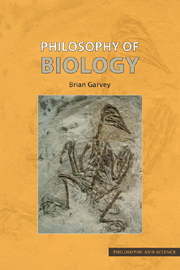Book contents
- Frontmatter
- Contents
- Acknowledgements
- Introduction
- 1 The argument in Darwin's Origin
- 2 The power of genes
- 3 Units of selection
- 4 Panglossianism and its discontents
- 5 The role of development
- 6 Nature and nurture
- 7 Function: “what it is for” versus “what it does”
- 8 Biological categories
- 9 Species and their special problems
- 10 Biology and philosophy of science
- 11 Evolution and epistemology
- 12 Evolution and religion
- 13 Evolution and human nature
- 14 Biology and ethics
- Notes
- Further reading
- Bibliography
- Index
1 - The argument in Darwin's Origin
- Frontmatter
- Contents
- Acknowledgements
- Introduction
- 1 The argument in Darwin's Origin
- 2 The power of genes
- 3 Units of selection
- 4 Panglossianism and its discontents
- 5 The role of development
- 6 Nature and nurture
- 7 Function: “what it is for” versus “what it does”
- 8 Biological categories
- 9 Species and their special problems
- 10 Biology and philosophy of science
- 11 Evolution and epistemology
- 12 Evolution and religion
- 13 Evolution and human nature
- 14 Biology and ethics
- Notes
- Further reading
- Bibliography
- Index
Summary
What often nowadays goes under the name “Darwin's theory of evolution” is in some ways different from Darwin's actual view. However, present-day evolutionists readily acknowledge that Darwin made the crucial breakthrough. In this chapter I want to show why that is.
Popular and polemical Darwinian literature often contrasts the theory of evolution with religious accounts of the origin of life, that is, with the claim that God is needed to explain the origin of life (e.g. Dawkins 1986). However, it is not at all obvious that the only alternative to Darwinism, as an account of why living things are the way they are, is that God created them that way. More sophisticated defences of Darwinism (e.g. Dennett 1995), sometimes contrast it not only with religious accounts, but with something that they refer to as “essentialism”. As this literature presents it, essentialism is, roughly speaking, the view that natural kinds – including biological species – can be given strict definitions, and are fixed and unchanging. It is true that Darwin perceived his assertion that species are not immutable as a major leap in thought: “At last gleams of light have come, and I am almost convinced (quite contrary to the opinion I started with) that species are not (it is like confessing a murder) immutable” (letter to Hooker, 11 January 1844, in Darwin & Seward 1903: 29). But in fact, as he was fully aware, he was not the first person to take this step.
- Type
- Chapter
- Information
- Philosophy of Biology , pp. 1 - 15Publisher: Acumen PublishingPrint publication year: 2007



